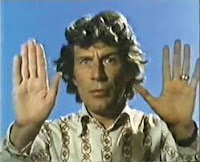Anyone who has seen me grimace when asked the dreaded
question ‘what’s your name’ will know just how much I’ve struggled with it.
‘Yehudit’, it means Jewish Woman, and relates to the
Biblical figure who chopped off a dude’s head. Kinda gory, and not really my
style, but a popular Israeli name nonetheless.
Not so popular in England though. I’ve seen countless people
freeze when they see it written down, not knowing how to approach it. There’s
that feeling of looking at a clearly foreign name and just giving up.
That’s the thing, it is clearly foreign. Anyone with a
non-Anglo name will know what it’s like. Because your name is different, it
seems to open the floodgates to anyone –from Uber drivers to Starbucks
baristas- to enquire about your heritage. Where
are you from? No, I mean originally? So you’re English, what about your
parents? Oh they’re English too… so… your name…?
It’s not that I mind particularly, it’s just I’m not always
in the mood to whip out my passport or explain Judaism.
According to my parents, at the age of 6 or so I decided to
cut my name down to Hudi. Though it was mainly a nickname at first, since I was
about 14 it’s the only name I go by. It’s still pretty weird, still marks me
out as foreign or Other, and people still don’t know to spell or say it. At
least I can just say ‘Yeah, sounds like the jumper,’ which I do, almost daily.
Don’t get me started on clubbing. There is something so
unappealing about sweaty guys I don’t know yelling above drum & bass ‘WHAT’S
YOUR NAME!? DID YOU SAY MILLIE!? WHERE ARE YOU FROM!!!!???’ So most of the time
I pick a random easy name like Emma or Lilly for clubs, cafes, and online
surveys.
 |
There’s been two occasions in my life where I’ve felt
differently, two occasions that changed the resentment and embarrassment I’ve
always felt.
One was when I visited Poland this January, something many
Jews do to witness the memorials to the Holocaust and often to meet survivors.
The memorial in Belzec concentration camp is a huge block of stone with names
of all those who died there. The
holocaust survivor, Lesley, who accompanied us stood there and spoke to us
about peace and acceptance. Of course we were not thinking about ourselves, but
it’s natural when faced with a list of first-names to be drawn to your own. I
think we also all felt it was another way to relate to what had happened there.
I spent a while searching for ‘Y’ and then realised with a
jolt that they had been translated to start with a ‘J’ instead. There was a
huge panel with variations of my name etched on to the block. Jehudit. Jeuda.
Judith. Jewish Man. Jewish Woman. I suddenly felt a strong, strong sense of
belonging. They may have been Polish and were born 100 years ago, but these
were people who shared my name. Their parents, just like mine, had felt proud
enough of their religious identity that they would label their child with it.
They refused to name their children with Polish or Russian or Hungarian names,
despite the potential for discrimination or worse.
As much as I may hate that my name isn’t as easy to
pronounce as Jessica or Alice, just like 100 years ago, it serves to remind
everyone that for some people, we are not just from where we were born -
whether that be Poland or England- we are Jewish too.
The other occasion was in summer, when I went on holiday to
Israel. When I got an order at Kosher McDonalds, I didn’t have to say ‘Lilly’.
Yeah, they laughed at my appalling pronunciation of my own name (Israelis say
Yoo-Deet’) but they knew exactly what I meant. It’s that same sense of
belonging, that there is a tiny country in the middle east where I can always
call home, where they pronounce my name better than I do.
 |
So what’s in a name? Well, I think, quite a lot.
You May Also Like...




Love this - and you x
ReplyDeleteTrue... in my country and my tribe, we derive the first word in our name from the last word in the name of our forefather, here - the paternal grandfather:)
ReplyDelete